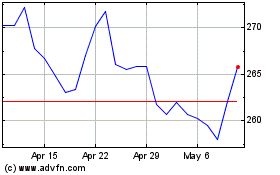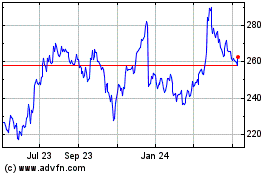Donald Trump, Meeting With Airline CEOs, Targets Air-Traffic-Control System
February 09 2017 - 2:15PM
Dow Jones News
By Carol E. Lee and Susan Carey
WASHINGTON -- President Donald Trump, meeting with airline
executives at the White House on Thursday, suggested adopting
changes to the government's air-traffic-control system and placing
a pilot at the head of the Federal Aviation Administration.
Mr. Trump also promised the executives he would reduce
government regulations, lower taxes on American businesses and fund
infrastructure upgrades, all of which he said would help their
companies hire more workers.
His agenda received a warm reception from those who attended the
meeting, which included chief executives from United Continental
Holdings Inc., Delta Air Lines Inc., Southwest Airlines Co., Alaska
Air Group Inc., three cargo carriers and heads of airports in Los
Angeles and Atlanta.
Mr. Trump said the air-traffic-control system is "totally out of
whack" and said his policies would soon start helping companies
such as airlines hire more people, including "rolling back
burdensome regulations" and "lowering the overall tax burden of
American businesses."
"We want the traveling public to have the greatest customer
service and with an absolute minimum of delays," Mr. Trump said.
"And we have an obsolete plane system, we have obsolete
airports."
Southwest CEO Gary Kelly, speaking to CNBC after the meeting,
welcomed the focus on modernizing the air-traffic-control system.
"We believe there is about $25 billion of waste annually with the
system that's currently being used," he said. "That's where I think
you can get the biggest bang for the buck."
Since Mr. Trump's election, airlines and airports have said they
are optimistic about his plans to lower taxes and raise
infrastructure spending. But it isn't yet clear how those policies
would be implemented.
Mr. Trump promised an announcement within the next three weeks
that he said would be "phenomenal in terms of tax."
Many airlines support a plan to remove air-traffic-control
operations from the FAA and place them into a not-for-profit
corporation. Some four dozen nations already have taken that step.
But an earlier House Republican effort to win congressional support
for the concept was unsuccessful.
Under the Obama administration, the FAA didn't back proposals to
switch to a privatized system and Senate Republican leadership also
balked at supporting such a move.
The FAA's mandate will expire in September, providing an opening
to discuss such changes. A spokeswoman for the FAA had no immediate
comment Thursday.
Most U.S. carriers believe a corporate air-traffic-control
system separate from the FAA would be more efficient because it
would allow them to raise funding from the financial markets,
rather than relying on congressional appropriations.
But Delta has opposed the plan, saying the transition would be
risky. Some corporate-jet and private pilots also oppose the
concept because they fear it would raise their costs.
U.S. airline shares briefly dipped after Mr. Trump's remarks
then recovered to hold onto earlier gains that topped the broader
market, led by a 3.3% advance at American Airlines Group Inc.
Some contentious issues, such as the administration's travel ban
barring citizens of seven nations from entering the U.S., don't
appear to have come up at the meeting. While the order has been
temporarily halted and is being reviewed by a federal appeals
court, the Jan. 27 order rocked the industry. Huge demonstrations
took place at many big airports opposing the order. Airlines were
caught unawares and struggled to comply.
Another hot topic that was barely broached was the disagreement
about the growth of Middle Eastern carriers into the U.S. and
whether they are infringing on air treaties. President Trump
alluded to it, however.
"I know you're under pressure from a lot of foreign elements and
foreign carriers," he said. "I've been hearing that a little bit.
At the same time, we want to make life good for them also. They
come with big investments. In many cases investments are made by
their governments, but they are still big investments."
American, Delta, and United are pressing the Trump
administration to review their two-year-old trade dispute with
three state-owned Middle Eastern carriers that the U.S. companies
allege have received billions of dollars in government subsidies.
Emirates Airline, Etihad Airways and Qatar Airways deny they are
subsidized. The three U.S. carriers are urging Washington to
determine that the subsidies violate what is known as the "open
skies" treaties the U.S. has with the United Arab Emirates and
Qatar.
But four other U.S. carriers support the 120 existing open-skies
treaties and oppose penalizing the Gulf airlines. They recently
wrote Secretary of State Rex Tillerson, saying the existing
agreements promote competition and help U.S. carriers build
international networks.
Meanwhile, airline unions are speaking out against Norwegian Air
Shuttle ASA, a low-cost carrier awarded a permit in December by the
Obama administration to operate to the U.S. from a subsidiary in
Ireland. Unions say the Irish base allows Norwegian to hire pilots
and other employees on less generous terms than they would receive
under Norway's strict labor laws.
The airline denies that. Norwegian says it is hiring U.S.-based
pilots and flight attendants to support its expansion and expected
to have 1,000 U.S.-based staff by the end of the year.
"We are pleased that the president understands the value foreign
airlines like Norwegian is contributing to the American economy,"
said a spokesman.
--Andy Pasztor and Doug Cameron contributed to this article.
Write to Carol E. Lee at carol.lee@wsj.com and Susan Carey at
susan.carey@wsj.com
(END) Dow Jones Newswires
February 09, 2017 14:00 ET (19:00 GMT)
Copyright (c) 2017 Dow Jones & Company, Inc.
FedEx (NYSE:FDX)
Historical Stock Chart
From Mar 2024 to Apr 2024

FedEx (NYSE:FDX)
Historical Stock Chart
From Apr 2023 to Apr 2024
